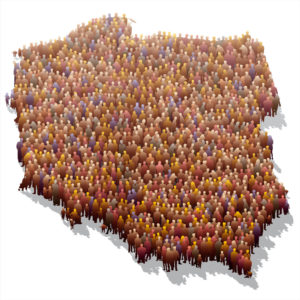
Democracy in Danger? (+pl)
Opublikowano: 21 kwietnia 2016
(polska wersja str. 2)
Democracy in Poland has always been a pleasant conversation topic. Poles had the opportunity to hear about the success of the last 26 years, the liberalization of life, steadily catching up to European standards, systemic changes that weren’t initiated in a bloody revolution, but by means of a transformation that was democratic to its core.
However, the context of the opinions made on the subject in fields both Polish and foreign, is quite different.
All this due to the results of the elections and the consequences of the decision made by the nation in 2015, when the conservative party Prawo i Sprawiedliwość (Law and Justice) won by a large majority, receiving more than 40% of the Sejm mandates and “possessing” a president from the same party. Due to the turmoil caused by the governing party’s regarding the choice of judges for the Constitutional Tribunal or the new order in public media, doubts have arisen regarding the state and direction of Polish democracy. There was a storm in the opposition party circles. People with KOD (the Democracy Defense Committee) banners took to the streets , while the opinions of certain foreign politicians contained some very strong phrases, such as “coup d’etat” or “an attack on the freedom of the media”.
What is democracy?
In the environment of young democracy (if only this trait was the sole determining factor), calling the Polish route of socio-political changes a success is justified. However, before we start considering if Poland’s situation is dire enough to be using direct statements like “coup d’etat”, let’s consider what democracy is and what are its immanent traits. In simple terms, used only for the needs of this description, let’s establish that democracy consists of several basic areas, among others.
– The institutional area, which comprises the system of equal distribution of power (along with its division, of course) and a crucial ingredient – the free elections made within the society
– The social area, defined as a social capital – society’s ability to take responsibility for the country and the direction it is taking, activity on the socio-economic stage and, most importantly, the awareness that they have a duty and a control prerogative in the face of the government.
– The legal area, which should be constructed in a way that allows the citizen to live a free life
– The economical area, where the influence of the market on the government should be limited and vice versa, as economical freedom is an important element of protecting civil rights.
– The media area, wherein free, independent media created and run with the idea of journalism in mind, function.
The democratic system is not limited to institutions, the social sphere or the electoral system. It’s a synergy of all those areas.
Regarding recent events, which are the cause of international doubts, we will evaluate three of the five areas in the context of Poland.
A flawed democracy
Once a year, The Economist uses their intelligence unit (the EIU) to conduct research that culminates with a publication ranking the democracies of the world. In 2015, when the change in the political power occurred in October, and the legal matters that caused international doubt occurred by the end of the year, the liberal-governed Poland (so governed by the camp defeated in October) fell from the 40th place to the 48th. Poland was outrun by Jamaica, East Timore, Tobago and Panama. In order to further highlight the context of the Economist ranking, it should be mentioned that Poland is also outrun by other post-communist countries like the Czech Republic, Slovakia, Lithuania and Bulgaria. Polish democracy was deemed a “flawed democracy” due to, among others, deficits in the social capital, or the prevalent political culture. But we all know this and we don’t need the Economist to rank us and remind us of it. We burden young democracy with it… However, democracy in the countries outrunning us is not the oldest either… They are often as young as us, or even younger.
What is wrong with Polish democracy, then?
There are various elements that require fixing. Many of them can’t be fixed just like that, e.g. through the introduction of laws. Some of them can be fixed, however…
The Polish voting system doesn’t allow the citizens to elect someone from outside a very narrow group of strongest parties, so to speak. There is a system responsible for financing the parties from the country’s budget and the number of votes required for a party to use that budget is much higher than, say, i in Germany. This serves as a serious obstacle for environments and movements that could otherwise start functioning. At a later stage, this results in the fossilization of the political scene and may cause the parliament to be little more than a facade through the placement of influential people in seats of power who often decide to assign the right places on voting lists, which gains them political loyalty and obedience. At a later stage, this leads to a party system where the party’s interest is paramount to the interest of the voters or the country. As opposed to systems where votes are made for the given candidate, in our system the responsibility is blurred, and the political position is not determined by the will of the voters, but the decision of the benefactors.
What about the other areas?
One of the accusations the current governing party must face pertains to the changes to the media law. We should then return to the times of the systemic transformation, where the democratization of the country happened due to the Round Table understanding. At that time, there were no free media in Poland. That sphere of democracy, as all others, was only being constructed. During this time, politics and the media sphere started to intertwine in a substantial manner. In order to exist in the political field, you needed to posses a media hinterland. This created a network of deep connections, relationships between the world of politics and the media. During those times, political personalities and media authorities were being shaped. It is worth adding that in the conditions of a democratic country, the media is tasked with watching the government’s every move, evaluating it and informing society so that they possess a knowledge of the events that they can use during the next elections and bring justice to the people by voting in the opposite direction. Can we truly say that they are fulfilling their role, knowing how the media have been constructed in Poland?
Should the answer be the known “Reporterzy Bez Granic” (Reporters Without Borders) rankings, we can say with complete awareness that they do not. According to those rankings, Poland does not meet the standards of a democratic country. At this point it should be noted that this isn’t a matter of early transformation – in 2007 we were closer to Third World Countries rather than Europe, for example. At that time, there have been many public removals from office in the media. They involved both managers of public broadcasting companies, journalists both better and less known, as well as regular employees. It can be said that the situation observed today is more of the same. The final nail in the coffin for “Free Media in Poland” is the 2014 situation – the tape scandal. On June 14, the “Wprost” weekly periodical published transcripts of several illegally registered conversations between politicians. The recordings pertained to the period between July 2013 and June 2014 and were recorded in several Warsaw restaurant, with current and former ministers, entrepreneurs and president of the NBP among the recorded. Soon after that, June 18 2014, a prosecutor enters “Wprost” headquarters with a group of Internal Security Agency (ABW) officials to take the media that were used to record the conversations. The editor in chief refuses to give them the media, with reference to the rule of journalistic confidentiality. The officials try to take the recordings by force, but in the end they leave the building empty-handed. This action was criticized by the media, the Helsinki Committee for Human Rights, and the OSCE, among others. We then find out from the press that the journalists responsible for the transcription, as well as their loved ones, have been under surveillance. In mid-January, the Chief of Police confirmed those allegations.
Democracy is more than just institutions – it’s mainly people and a system of personal connections, the modus operandi of which has changed in Poland since the systemic transformation in form more so than in content. The case of media freedom can be topped off with the fact that Poland has never really undergone a thorough investigation. Opening the archives would surely protect many people, such as those working in the media, from blackmail.
The Constitutional Tribunal
Should we delve into the subject without leaning on the interpretations of the governing party and the opposition, the controversy surrounding the Constitutional Tribunal is not as complex as it may seem. In simple terms, it can be said that by the end of the previous Sejm term, the liberal PO-PSL coalition decided on the unconstitutional move of appointing five judges, for whom the term has ended after the Sejm’s term. The previous Sejm had no right to do that. During the current term, PiS has decided to appoint five judges, although they had the right to appoint two. Therefore, three judges were denied the right to swear their oaths and were replaced by PiS’s own candidates. Of course, we could try to decide who was right, if the choice made in the previous term was legal, if the argument made by PiS regarding the legal basis of electing judges is valid or not. Debating this issue is complicated because, in the event of a political dispute, there can be no simple cases. However, it isn’t this matter that should currently be on everyone’s minds. The more important thing is what kind of institution the Tribunal has become. During the previous Sejm term, a coalition MP called for order, followed by a very telling sentence. That sentence was: “We will elect our judges, and then you will elect yours.”
This statement is a perfect summary of the core of the problem. Our judges. Your judges. Neither of the governing forces refers to them as independent guardians of Poland’s compliance with the Constitution. There is a debate on the nomination, as if it were so important. Why is the nomination so important if this is an independent authority? Court or political authority? If the role of the Constitutional Tribunal is supervising the compliance of legal acts with the Constitution with the law, Constitution, and blind justice as the base of their actions, then why are the judges of such an important institution elected by politicians? And let’s ask ourself this question again: why is this nomination so important for the politicians themselves? Perhaps we should forward a hypothesis that an additional task for them is protecting the interests of the governing party? Or paralyzing the actions of the victorious government? Hundreds of questions? So far, however, this is all conjecture. And though they can’t be confirmed, the fact that there are doubts is reason enough to reform this institution and transfer its competences to the Supreme Court, or implement another method of nominating judges.
The activity of Poles in active voting law is very negative. A large part of society, having the knowledge of how insignificant voting really is for Polish politics, ends up quite simply boycotting the votes. The statistics are harsh. A turnout higher than 50% – 60% is a pipe dream. On the other hand, social activity on the level of organizations and associations, foundations and clubs is very high. However, even here, studies show, things are not great. Statistics indicate that the Poles’ interest in activity for social organizations is in no small part caused by extra-societal factors, such as receiving a subsidy, financing, or fulfilling company goals or reducing fiscal burden.
Summary
Is Polish democracy in danger?
Yes… and no. Why the ambivalence? The answer largely depends on the assumptions we make.
The current outrage or doubt that are expressed by the international environment is an indication that something is happening in Poland that distorts the previous legal and political status quo with regard to its democratic nature. Though it should be noted that the current actions taken by the Polish government, such as “combating” the country, showing no respect for the law, customs and culture of democratic Poland is an act that can hardly be called subtle, but is hardly a new thing. The same story happened earlier, because that’s just the nature of Poland’s governing system. In simple terms, it can be summed up with a short sentence: In order to rule effectively, you should take over the country and make sure that as many authorities are dependent on you as possible.
At the same time, you should not use mistakes made by your predecessors to justify and defend the actions taken by the new government, which simply promised a “good change”.
We reach the point where one has to admit that, while it’s not easy to say this about your own country, objectively, Poland’s democracy is in danger. This danger has been permanent since the transformation. Democracy has been taken over by a system of party cartels and various interest groups. The democracy that many watchers today worry about was never there to begin with. It was only a facade. And it is a huge one – creating a field for social, economic and scientific activity. It is a sort of illusion where you can function effectively enough to call it a “flawed democracy”. However, it would seem more appropriate to call it a factitious democracy.
Written by: Konrad Michalski
Tagi: constitution, crisis, democracy in poland, freedom, media, tribunal






Dodaj komentarz